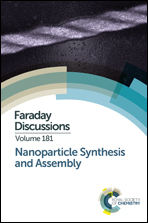Temperature effects on nanostructure and mechanical properties of single-nanoparticle thick membranes
Abstract
The properties of mechanically stable single-nanoparticle (NP)-thick membranes have largely been studied at room temperature. How these membranes soften as nanoparticle ligands disorder with increasing temperature is unknown. Molecular dynamics simulations are used to probe the temperature dependence of the mechanical and nanostructural properties of nanoparticle membranes made of 6 nm diameter Au nanoparticles coated with dodecanethiol ligands and terminated with either methyl (CH3) or carboxyl (COOH) terminal groups. For methyl-terminated ligands, interactions along the alkane chain provide mechanical stiffness, with a Young's modulus of 1.7 GPa at 300 K. For carboxyl-terminated chains, end-group interactions are significant, producing stiffer membranes at all temperatures, with a Young's modulus of 3.8 GPa at 300 K. For both end-group types, membrane stiffness is reduced to zero at about 400 K. Ligand structure and mechanical properties of membranes at 300 K that have been annealed at 400 K are comparable to samples that do not undergo thermal annealing.
- This article is part of the themed collection: Nanoparticle Synthesis and Assembly

 Please wait while we load your content...
Please wait while we load your content...